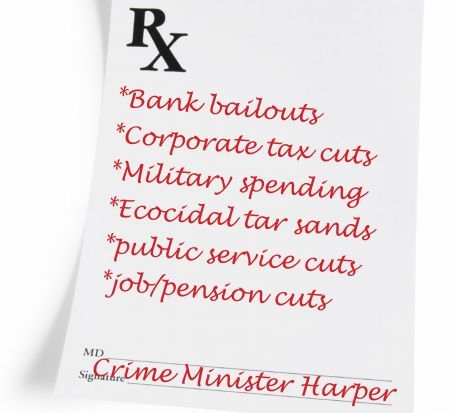News
You are here
Harper's budget: a hazard to your health

February 10, 2014
In the midst of economic crisis, Harper continues to “balance the budget” on the backs of the 99%. The abstract and misleading mantra of “deficit-reduction” obscures the content of revenue and spending policies that transfer wealth to corporations and the military while ignoring the climate crisis, and the budget’s timing (February 11) is designed to reduce scrutiny amidst the Olympics.
“Deficit-reduction”
Much is made of the $18 billion federal deficit, but little about what produced it. Harper responded to capitalism’s latest economic crisis by spending billions on bailing out the banks, while continuing the Liberal drive to undermine government revenue through tax cuts for corporations and the 1%. The latest addition is the proposed income-splitting for families with children, which would provide no benefit to 86 per cent of families and yet cost $5 billion—the same amount that could fund a national childcare program benefiting far more people, especially women.
The government is also giving oil companies $1 billion in subsidies, whose tar sands and pipelines undermine First Nations, produce deadly spills like in Lac-Mégantic, and drive costly climate disasters like the floods in Alberta and Toronto. The resulting deficit then became an excuse to cut public services—scapegoating small but essential programs like the Interim Federal Health program for refugees.
According to Erin Weir, economist with the United Steelworkers, “The federal Conservative government has reduced the size of the Canadian state almost to record low levels relative to the Canadian economy.” While Harper is cutting the public sector and public services, he is strengthening the Canadian state’s repressive apparatus—prisons, spying and the military. Federal spending between 2010 and 2017 will have declined by $90 billion, but just a few months ago Harper announced $100 billion for 15 new battleships. This is part of the Canada First Defense Strategy of spending $490 billion on the military over 20 years—clearly not intended for veterans that Harper sees as mere cannon fodder, who don’t deserve pensions or services.
Do-nothing
According to NDP finance critic Peggy Nash, “the Conservatives are signalling it will be a do-nothing budget. If they are going to wait another year or more to do anything, they are really abandoning the unemployed and abandoning all the families that are feeling so squeezed economically.”
But what does the NDP leadership propose instead? Limits on ATM fees. The NDP has launched a campaign on “making life more affordable,” that focuses in consumer frustrations around bank fees and gas prices. So nothing on the bank bailouts, corporate tax cuts or military spending that produced the deficit, nothing on challenging the tar sands that are destroying the planet on which we all depend. Instead there’s just the call to renew a small program of tax credits toward home renovations that increase energy efficiency, and a focus on “a return to the normal growth cycle of the economy”—an economy that exploits the 99%, and the planet, for the benefit of the 1%.
The fight for reforms
Rather than trying to reassure Bay Street and reduce people to consumers, the Canadian Centre for Policy Alternatives’ Alternative Federal Budget reflects the resistance movements and demands that have challenged the Harper agenda. The alternative budget shows how the resources exist to fund national programs for childcare and pharmacare, improve affordable housing and employment insurance, reduce tuition and restore to 65 the age of eligibility for Old Age Insurance, improve First Nations water and housing infrastructure and fund a commission of inquiry into missing and murdered aboriginal women, and restore funding to the Interim Federal Health Program and women’s groups who focus on independent research and advocacy.
The alternative budget would lift 855,000 people out of poverty, and would be covered by simply restoring military spending to pre-9/11 levels and restoring the corporate tax rate to half way between the 2000 and 2001 levels. We can go much further than that: last month the Canadian Peace Alliance launched the Peace & Prosperity not War & Austerity campaign, calling for the nearly half trillion dollars of military spending to be redirected into jobs, public services and the environment. Through the fight for these reforms we can begin to imagine a world free from war, austerity and oppression, and run by the 99% to meet our collective needs and that of the planet.
Section:
Topics:










